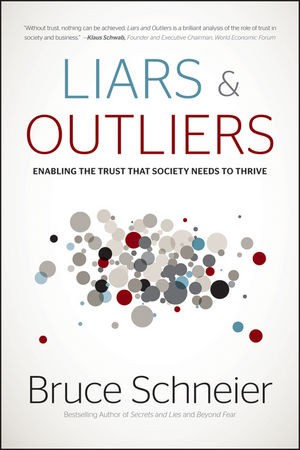- Rating
- Category
- non-fiction
- Read
- 2017-01-08
- Pages
- 348
Insightful book about various tradeoffs between security, cost, and freedom.
“One of the great achievements of our species is our ability to solve societal dilemmas. In a way, we solve them by cheating. That is, we don’t solve them within the parameters of the game. Instead, we modify the game to eliminate the dilemma. Recall the two drivers stuck behind a fallen tree that neither one can move by himself. They’re not in a Prisoner’s Dilemma. They’re not even in a Snowdrift Dilemma. In their situation, their selfish interest coincides with the group interest—they’re going to move the tree and get on with their lives. The trick to solving societal dilemmas is make them look like that. That’s what societal pressures do: they’re how society puts its thumb on the scales.”
“An increase in the severity of punishment often doesn’t translate into a drop in crime; an increase in the probability of punishment often does.”
“But we often treat organizations as if they actually were individuals, assuming that societal pressures work on them in the same way they do on individuals. This doesn’t work, and results in some pretty bad trust failures, and high scopes of defection. […] It’s only a bit over the top to call corporations “immortal sociopaths,” as attorney and writer Joel Baken did.”
“In the real world, the knobs are poorly marked and badly calibrated, there’s a delay after you turn one of them before you notice any effects, and there’s so much else going on that it’s hard to figure out what the effect actually is. Think of a bathtub with leaky unmarked faucets, where you can’t directly see the water coming out of the spout…outside, in the rain. You sit in the tub, oscillating back and forth between the water being too hot and too cold, and eventually you give up and take an uncomfortable bath. That’s a more accurate metaphor for the degree of control we have with societal pressures”
